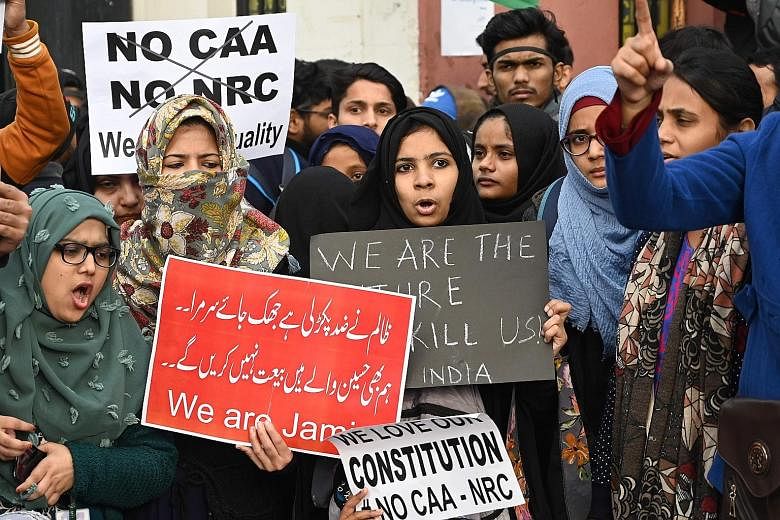NEW DELHI • India's Supreme Court yesterday postponed hearing pleas challenging the constitutionality of a new citizenship law that has sparked opposition and massive protests across the country.
The court said it would consider the pleas on Jan 22.
Protests and widespread condemnation have been growing against the Citizenship Amendment Act (CAA), with demonstrations erupting in India over the last week.
The new law applies to Hindus, Christians and other religious minorities who are in India illegally but can demonstrate religious persecution in Muslim-majority Bangladesh, Pakistan and Afghanistan. It does not apply to Muslims.
Critics say the new law is part of Prime Minister Narendra Modi's Hindu nationalist-led government's agenda to marginalise India's 200 million Muslims and that it goes against the spirit of the country's secular Constitution.
Mr Modi has defended it as a humanitarian gesture.
"We want a stay order in the CAA case," said Mr Kapil Sibal, a lawyer for petitioners who challenged the law in court, adding it was in conflict with parts of the Indian Constitution guaranteeing equality to all.
Supreme Court Chief Justice S. A. Bobde refused requests to hold off the implementation of the law, which came into effect last week. The court will, however, hear petitions challenging the constitutional validity of the law on Jan 22.
Its passage last week follows a contentious citizenship registry process in north-eastern Assam state intended to weed out people who entered India illegally.
Nearly two million people in Assam - half Hindu, half Muslim - were excluded from the list and have been asked to prove their citizenship or be considered foreign.
India is building a detention centre for some of the tens of thousands of people the courts are expected to ultimately determine have entered the country illegally.
The passage of the new law also came as an unprecedented crackdown continued in Kashmir, India's only Muslim-majority area, which was stripped of special constitutional protections and its statehood in August. Since then, movement and communications have been restricted in the region.
University students across India have been leading a campaign to have the citizenship law overturned.
On Sunday, marches by students at New Delhi's Jamia Millia Islamia university and Aligarh Muslim University in Uttar Pradesh descended into chaos when police fired tear gas and beat unarmed protesters with wooden sticks.
Scores of students were injured. Police say they acted with restraint.
The police response to the protests has drawn widespread condemnation. It has also sparked a broader movement against the CAA. Demonstrations have erupted across the country, with thousands rallying in West Bengal, Tamil Nadu and Karnataka states on Tuesday.
Yesterday, the authorities tightened security curbs, implementing a curfew in Assam, where ongoing protests have disrupted daily life in Gauhati, the state capital.
The authorities also restricted assembly in a Muslim neighbourhood in New Delhi where demonstrators torched a police booth and several vehicles on Tuesday.
ASSOCIATED PRESS, REUTERS

